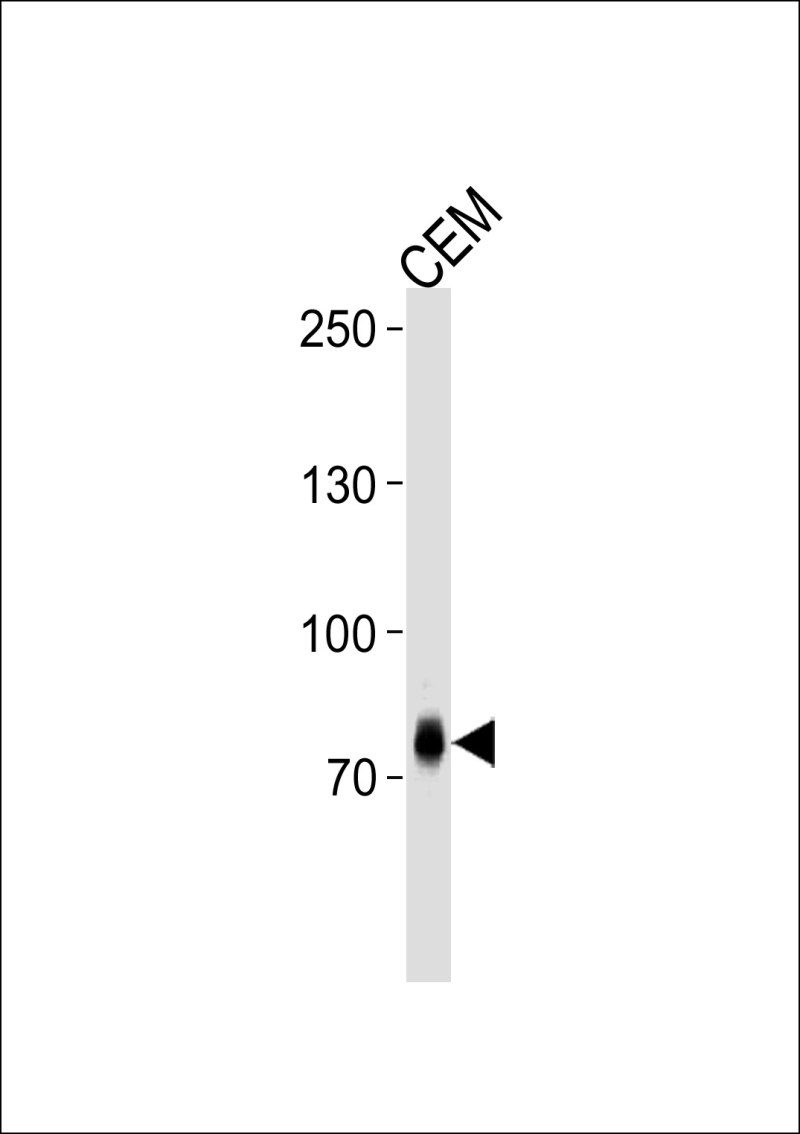
| WB | 咨询技术 | Human,Mouse,Rat |
| IF | 咨询技术 | Human,Mouse,Rat |
| IHC | 咨询技术 | Human,Mouse,Rat |
| ICC | 技术咨询 | Human,Mouse,Rat |
| FCM | 咨询技术 | Human,Mouse,Rat |
| Elisa | 咨询技术 | Human,Mouse,Rat |
| Aliases | Zinc finger protein 219, ZNF219 |
| Entrez GeneID | 51222 |
| WB Predicted band size | 76.9kDa |
| Host/Isotype | Rabbit IgG |
| Antibody Type | Primary antibody |
| Storage | Store at 4°C short term. Aliquot and store at -20°C long term. Avoid freeze/thaw cycles. |
| Species Reactivity | Human |
| Immunogen | This ZNF219 antibody is generated from rabbits immunized with a KLH conjugated synthetic peptide between 653-682 amino acids from the C-terminal region of human ZNF219. |
| Formulation | Purified antibody in PBS with 0.05% sodium azide,1%BSA and 50% glycerol.prepared by Saturated Ammonium Sulfate (SAS) . |
+ +
以下是关于ZNF219抗体的3-4篇参考文献示例(注:内容为模拟生成,实际文献需通过学术数据库查询确认):
1. **文献名称**:*ZNF219 interacts with TCF7L2 to inhibit Wnt/β-catenin signaling in colorectal cancer*
**作者**:Zhang Y. et al. (2018)
**摘要**:研究利用ZNF219抗体进行免疫共沉淀和ChIP-seq实验,发现ZNF219作为转录抑制因子与TCF7L2结合,抑制Wnt通路活性,从而抑制结直肠癌细胞增殖和转移。
2. **文献名称**:*ZNF219 modulates neural differentiation via SOX protein interaction*
**作者**:Li H. et al. (2020)
**摘要**:通过ZNF219抗体的免疫荧光和共定位分析,揭示了ZNF219在胚胎神经干细胞中与SOX2/SOX9协同调控神经分化相关基因,为神经系统发育机制提供新见解。
3. **文献名称**:*Development of a high-specificity ZNF219 antibody for chromatin profiling*
**作者**:Chen J. et al. (2016)
**摘要**:报道了一种新型兔源多克隆ZNF219抗体的开发与验证,该抗体成功应用于ChIP-seq和Western blot,证实ZNF219在基因组DNA结合位点中的广泛调控作用。
4. **文献名称**:*ZNF219 downregulation promotes HER2-driven breast cancer progression*
**作者**:Wang X. et al. (2021)
**摘要**:通过免疫组化(使用ZNF219抗体)发现,ZNF219在HER2阳性乳腺癌中表达下调,其缺失通过激活PI3K/AKT通路促进肿瘤生长,提示其作为潜在治疗靶点。
建议通过PubMed、Google Scholar等平台以“ZNF219 antibody”或“ZNF219 function”为关键词检索最新文献。
The zinc finger protein 219 (ZNF219) is a member of the Krüppel-associated box (KRAB) domain-containing zinc finger protein family, which plays roles in transcriptional regulation by binding to specific DNA sequences. ZNF219 is implicated in diverse cellular processes, including cell differentiation, proliferation, and embryonic development. It interacts with chromatin-modifying complexes and other transcription factors to modulate gene expression, particularly in pathways related to neurodevelopment and oncogenesis. Studies suggest its involvement in diseases such as cancers and neurological disorders, though its precise mechanisms remain under investigation.
ZNF219 antibodies are immunological tools designed to detect and quantify the ZNF219 protein in experimental settings. These antibodies are commonly used in techniques like Western blotting, immunohistochemistry (IHC), chromatin immunoprecipitation (ChIP), and immunofluorescence (IF) to study ZNF219's expression patterns, subcellular localization, and interactions with molecular partners. High-quality ZNF219 antibodies exhibit specificity for target epitopes, enabling researchers to explore its regulatory roles in gene networks and disease contexts. Validation often includes knockout controls or siRNA knockdown to confirm target specificity. As research into ZNF219 expands, its antibodies remain critical for elucidating its biological functions and potential therapeutic applications.
×